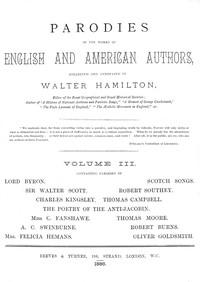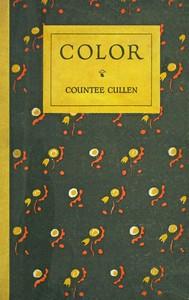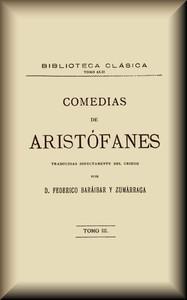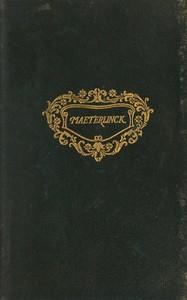|
|
Read this ebook for free! No credit card needed, absolutely nothing to pay.Words: 132414 in 48 pages
This is an ebook sharing website. You can read the uploaded ebooks for free here. No credit cards needed, nothing to pay. If you want to own a digital copy of the ebook, or want to read offline with your favorite ebook-reader, then you can choose to buy and download the ebook.

: Parodies of the works of English & American authors vol. III by Hamilton Walter Compiler - Parodies@FreeBooksThu 08 Jun, 2023 EACH PART MAY BE PURCHASED SEPARATELY. NOTES AND CORRECTIONS. Page 71, Column 2, line 6. Read "Mr. William Cadenhead." Page 197. The Enigma on the letter H. here ascribed to Lord Byron was written by Miss Catherine Fanshawe. PARODY strongly resembles mimicry, a principle in human nature not so artificial as it appears. Man may well be defined a mimetic animal. The African boy who amused the whole kafle he journeyed with, by mimicking the gestures and the voice of the auctioneer who had sold him at the slave market a few days before, could have had no sense of scorn, of superiority, or of malignity; the boy experienced merely the pleasure of repeating attitudes and intonations which had so forcibly excited his interest. The numerous parodies of Hamlet's soliloquy were never made in derision of that solemn monologue, no more than the travesties of Virgil by Scarron and Cotton; their authors were never so gaily mad as that. We have parodies on the Psalms by Luther; Dodsley parodied the book of Chronicles, and Franklin's most beautiful story of Abraham is a parody on the Scripture-style; not one of these writers, however, proposed to ridicule their originals; some ingenuity in the application was all that they intended. The lady-critic alluded to had suffered by a panic, in imagining that a parody was necessarily a corrosive satire. Had she indeed proceeded one step further, and asserted that PARODIES might be classed among the most malicious inventions in literature, in such parodies as Colman and Lloyd made on Gray's odes, in their odes to "Oblivion and Obscurity," her readings possibly might have supplied the materials of the present research. PARODIES were frequently practised by the ancients, and with them, like ourselves, consisted of a work grafted on another work, but which turned on a different subject by a slight change of the expressions. It might be a sport of fancy, the innocent child of mirth; or a satirical arrow drawn from the quiver of caustic criticism; or it was that malignant art which only studies to make the original of the parody, however beautiful, contemptible and ridiculous. Human nature thus enters into the composition of parodies, and their variable character originates in the purpose of their application. This taste for parodies was very prevalent with the Grecians, and is a species of humour which perhaps has been too rarely practised by the moderns: Cervantes has some passages of this nature in his parodies of the old chivalric romances; Fielding in some parts of his Tom Jones and Joseph Andrews, in his burlesque poetical descriptions; and Swift in his "Battle of Books," and "Tale of a Tub," but few writers have equalled the delicacy and felicity of Pope's parodies in the "Rape of the Lock." Such parodies give refinement to burlesque. Boileau affords a happy instance of this simple parody. Corneille, in his Cid, makes one of his personages remark, "Pour grands que soient les rois ils sont ce que nous sommes, Ils peuvent se tromper comme les autres hommes." A slight alteration became a fine parody in Boileau's "Chapelain D?coifl?." We find in Athenaeus the name of the Inventor of a species of parody which more immediately engages our notice--DRAMATIC PARODIES. It appears this inventor was a satirist, so that the lady-critic, whose opinion we had the honour of noticing, would be warranted by appealing to its origin to determine the nature of the thing. A dramatic parody, which produced the greatest effect, was "the Gigantomachia." as appears by the only circumstance known of it. Never laughed the Athenians so heartily as at its representation, for the fatal news of the deplorable state to which the affairs of the republic were reduced in Sicily arrived at its first representation--and the Athenians continued laughing to the end! as the modern Athenians, the volatile Parisians, might in their national concern of an OPERA COMIQUE. It was the business of the dramatic parody to turn the solemn tragedy, which the audience had just seen exhibited, into a farcical comedy; the same actors who had appeared in magnificent dresses, now returned on the stage in grotesque habiliments, with odd postures and gestures, while the story, though the same, was incongruous and ludicrous. The Cyclops of Euripides is probably the only remaining specimen; for this may be considered as a parody of the ninth book of the Odyssey--the adventures of Ulysses in the cave of Polyphemus, where Silenus and a chorus of satyrs are farcically introduced, to contrast with the grave narrative of Homer, of the shifts and escape of the cunning man "from the one-eyed ogre." The jokes are too coarse for the French taste of Brumoy, who, in his translation, goes on with a critical growl and foolish apology for Euripides having written a farce; Brumoy, like Pistol, is forced to eat his onion, but with a worse grace, swallowing and execrating to the end. In dramatic composition, Aristophanes is perpetually hooking in parodies of Euripides, whom of all poets he hated, as well as of AEschylus, Sophocles, and other tragic bards. Since that Grecian wit, at length, has found a translator saturated with his genius, and an interpreter as philosophical, the subject of Grecian parody will probably be reflected in a clearer light from his researches. Free books android app tbrJar TBR JAR Read Free books online gutenberg More posts by @FreeBooks

: Comedias tomo 3 de 3 by Aristophanes BCE BCE Bar Ibar Y Zum Rraga Federico Translator - Athens (Greece) Drama; Aristophanes Translations into Spanish; Greek drama (Comedy) Translations into Spanish@FreeBooksThu 08 Jun, 2023
|
Terms of Use Stock Market News! © gutenberg.org.in2025 All Rights reserved.






